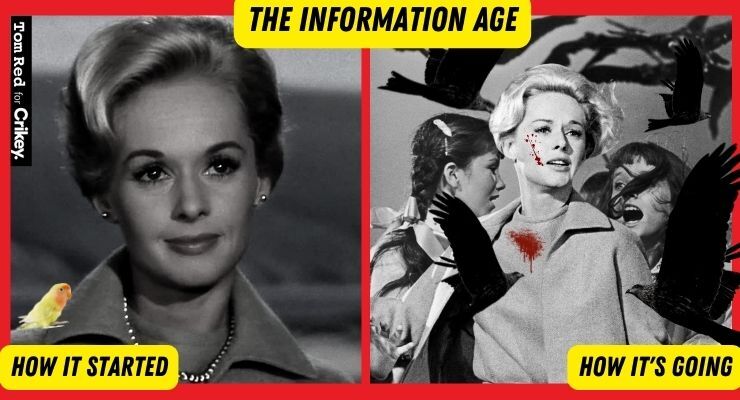
Media systems have no answer for toxic polarisation. The development of a public-service internet and public-service media needs to be on the agenda.
Six months after journalists Maria Ressa and Dmitry Muratov were honoured with the Nobel Peace Prize, little of the celebratory mood remains. Ressa’s Philippines is deep in an election season marred by all the dysfunctions independent media like hers have been trying to combat: industrial-scale disinformation and hate speech, patronage politics dominated by oligarchs and other elites, and the appeal of charismatic personalities over human rights.
Muratov’s Russia, meanwhile, has gone to war against its neighbour and made domestic dissent so dangerous that he has suspended the publication of his newspaper Novaya Gazeta even as pro-regime television news churns out war propaganda.
Such ups and downs are emblematic of the global situation since the last World Press Freedom Day. Over the past year, print and digital media have produced plenty of exemplary journalism, but the overall picture has grown even grimmer.
Take India. Once considered the world’s largest democracy, it has been relegated to “electoral autocracy” status. Its independent media still survive, and its citizens are still able to foil the state occasionally — see the massive farmer protests. But nothing has been able to reverse India’s descent into orchestrated, systemic majoritarian hate.
This mixed state of affairs is partly due to the fact that press freedom is a multidimensional construct. Behind the deceptive simplicity of press freedom indices and rankings are dozens of scores measuring legal, political, economic and cultural factors ranging from whether journalists are protected from government threats and hate speech, to whether media owners encourage self-censorship, to whether the country’s linguistic diversity is well represented.
Nor is the relationship between press freedom and democracy one-dimensional. Free and independent media are needed to act as a watchdog on power and to air public opinion. Less obviously, media have another important democratic role: as enablers of conversations among different groups in society, helping diverse communities to constitute themselves as public and act collectively for the common good.
Technology-driven change affects each of these media attributes and roles in different ways, so there is no simple answer to the question of whether the internet has helped or hurt democracy-enhancing journalism.
Overall, it is fair to say that the digital revolution has helped make media more plural, participatory and protest-friendly. But its contribution to tolerant, diverse publics appears negligible or even negative. This is contrary to hopes two decades ago that the internet would help form a “digital public sphere” far more democratic and inclusive than pre-digital society.
The 15 minutes of fame that digital media dishes out to people previously known as the audience does not necessarily add up to a national, let alone global, conversation that cuts across social and ideological divides.
This is a problem because democracy is a highly demanding way to organise public life, requiring not only the freedom to speak but also a commitment to listen and to respect others’ equal rights even when consensus is elusive. But instead of enlarging common spaces for democratic deliberation, the global trend is towards political polarisation, according to the newly released annual report of the Sweden-based Varieties of Democracy (V-Dem) project.
It defines political polarisation as a division of society into antagonistic “Us v Them camps”. Over the past decade, by V-Dem’s count, 40 countries have hit toxic levels of polarisation, characterised among other things by the use of hate speech in major political parties’ rhetoric.
The internet is, of course, not the only driver of polarisation. Economic systems’ failure to sustain hope in existing models of progress has generated resentments and fears. Instead of addressing these underlying problems, politicians find it easier to engage in identity politics, scapegoating foreigners, minorities and democratic institutions for their countries’ ills.
Social media platforms have not helped, to put it mildly. They are designed to group people into smaller networks for more efficient commercial microtargeting, rather than create fora for diverse citizens to meet. Their robots’ bias for virality over verifiability has been a boon for the disinformation industry. Beneficiaries include state sponsors of propaganda and their media allies and other private-sector partners. Public-interest journalists are outnumbered and outgunned.
The result is an internet far removed from the vision for a “global social world … that all may enter without privilege or prejudice accorded by race, economic power, military force, or station of birth”, in the words of John Perry Barlow’s 1996 cyberspace manifesto. It is an internet that does not promote mutual understanding and civil disagreement among people’s different views and values.
Social media companies’ enforcement of their community standards, including Facebook’s Oversight Board, is a token move that distracts from the urgent challenge to create a new internet. Elon Musk believes he has solutions for Twitter and is putting his money where his mouth is, but it is unclear if he even understands the problem. We need a more fundamental overhaul, of the kind envisioned by a group of communication scholars and practitioners in their manifesto to create a public service internet.
Released last June and signed by more than 1200 scholars since, it calls for a publicly funded “internet of the public, by the public, and for the public; an internet that advances instead of threatens democracy and the public sphere, and an internet that provides a new and dynamic shared space for connection, exchange and collaboration”.
The manifesto also called for investments in public-service media. Indeed, it is impossible to conceive of democratic deliberation succeeding in any polity without well-resourced news organisations of sizeable scale that are dedicated to professional norms of public-interest journalism.
A healthy media ecosystem must include national public-funded media independent of the government of the day. These are found in most liberal democracies, but they have been undercut by digital disruption as well as politicians and business people unhappy with these organisations’ autonomy.
In non-democracies, state-funded broadcasters are invariably government controlled, making them more likely to be part of the problem of political polarisation than the solution.
Within the news industry, most discussions have skirted these questions, focusing instead on sustainable business models for private media organisations in the wake of digital disruptions. Even if these are viable ways to produce substantial, high-quality watchdog journalism, they will lack the reach and scale to serve as a public sphere that can counteract the trends toward political polarisation and identity politics.
The development of a public-service internet and public-service media needs to be on the agenda. The Catch-22, though, is that the highly polarised countries that most urgently need concerted interventions are also the least likely to be able to muster support for the required media reforms.
Originally published under Creative Commons by 360info™.








Here’s an excellent idea to fix this.
The incoming Labor Guv should amend the News Media and Digital Platforms Mandatory Bargaining Code to require the platforms to pick up the news of the independent sites. There is no need to privilege the corporates. In the interest of free speech and diversity, the formula could direct readers to Crikey or Green Left Weekly or Jacobin and other reputable journals instead of the shite pumped out by Channel 9 and the Oz.
This would encourage the independents, give them revenue and readers, allow them to employ more great journos, and get on with saving democracy.
There was no mandate for this law to save corporate media, and the legislation could be used by the ALP to weaken the Murdochracy.
And yet no mention on how mainstream media is also a driver behind misinformation – distributors of mis/disinfo themselves which also causes people to find other sources who then can fall foul with believing other mis/disinfo found on the internet. The authorative-ness of the mainstream has been diminished and they have learned nothing. Not after 9/11, not after Trump. We also see increased partisannes from media proprietors who have been normalising antagonising language for a long time
Media reform? Seems ABC news really is changing.
Today they published this article on the new affirmative consent laws in the ACT, and low and behold they went to the effort of seeking counter view points. That legal expert expressed a range of concerns about the impact on the presumption of innocence in criminal proceedings, the medias constant use of the term ‘victim survivor’ before anything has been tested in court, and finally raising questions around the mechanics of affirmative consent in various types of relationships.
I’ve criticized ABC news plenty of times here for one dimensional politically correct reporting, but a balanced article like this deserves praise. More like this please ABC.
https://www.abc.net.au/news/2022-05-05/act-passes-affirmative-consent-laws-territory-in-line-with-nsw/101040154
Interesting that the author lists Russia as banning independent media while completely ignoring the Ukraine situation. All left of centre parties have been closed down and anyone brave enough to push hard for peace, is likely to receive a visit from the SBU , their security service. And that doesn’t end well . Well credentialled observers such as Chris Hedges a Pulitzer Prize winning former war correspondent, are forthright in stating that Ukraine is not a democracy. Under siege it may be, but a democracy it ain’t!
One would take Chris Hedges views with a grain of salt these days, although excellent on US matters of Evangelicals and Christian fascism, he has become angry by and obsessed about his own nation, and he became compromised by his need to promote himself i.e. via RT, and of late with his own program on YouTube too (‘Chris Hedges Report’).
On the latter he hosted conservative and very competent UK journalist Peter Oborne (who also turns up on the ByLine Times which has had people on the ground actually on the ground in Ukraine, like RFE in Russia) to posit a US conspiracy that Ukraine’s citizens are ‘worthy victims’ while Yemeni are ‘not worthy victims’; it was sophistry masking ‘whataboutery’ from Hedges to deflect from the aggressive actions Putin’s Russia (who were barely mentioned in the discussion).
Further, this highlights an issue of Ukraine coverage i.e. any open Russian based reporting is precluded by law & security services, journalists etc. can still operate in large parts of Ukraine supported by citizen type journalism/SM, but analysis from the ‘Anglosphere’ of UK, US or Australia relies more on past prisms, ideology and even conspiracy theories while ignoring realities on the ground, that are more difficult to parse through.